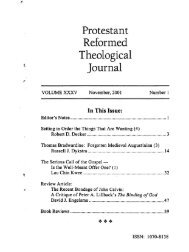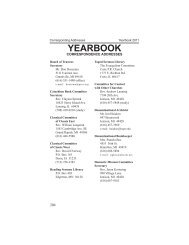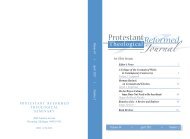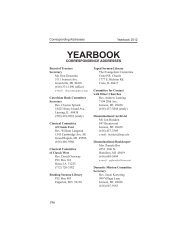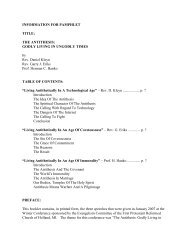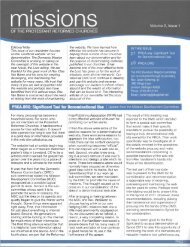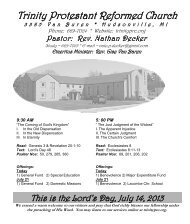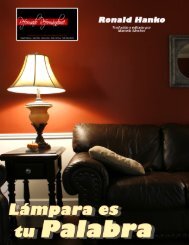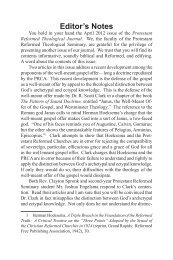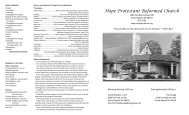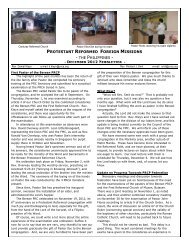November 2007 - Protestant Reformed Churches in America
November 2007 - Protestant Reformed Churches in America
November 2007 - Protestant Reformed Churches in America
Create successful ePaper yourself
Turn your PDF publications into a flip-book with our unique Google optimized e-Paper software.
Book Reviews<br />
Lillback’s thesis is that Luther people, and declares them to be<br />
and Calv<strong>in</strong> differed <strong>in</strong> their understand<strong>in</strong>g<br />
of justification. God’s work of mak<strong>in</strong>g His<br />
righteous. Justification is not<br />
The difference was that Luther people holy and enabl<strong>in</strong>g them<br />
<strong>in</strong>cluded regeneration and renewal<br />
<strong>in</strong> his doctr<strong>in</strong>e of justifi-<br />
a work, but it is not justifica-<br />
to do good works. There is such<br />
cation, while Calv<strong>in</strong> excluded tion; it is sanctification. Justification<br />
is strictly legal; it is<br />
renewal from his doctr<strong>in</strong>e. Supposedly,<br />
Calv<strong>in</strong> alone emphasized<br />
the forensic nature of jus-<br />
His people are righteous on the<br />
strictly God’s declaration that<br />
tification, while Luther tried to basis of Christ’s work. The term<br />
comb<strong>in</strong>e renewal and forensic “forensic” expresses that legal<br />
justification. “In particular, we act, and guards justification<br />
will consider how Luther and from be<strong>in</strong>g confused with sanctification.<br />
the early Lutherans <strong>in</strong>cluded<br />
regeneration <strong>in</strong> their doctr<strong>in</strong>e of The term “renewal” describes<br />
God’s work of regenera-<br />
justification, seek<strong>in</strong>g to harmonize<br />
it with the forensic idea of tion and sanctification. It is His<br />
justification. But we shall also work of giv<strong>in</strong>g His people new<br />
see that Calv<strong>in</strong>’s teach<strong>in</strong>g on life, nurtur<strong>in</strong>g that life, mak<strong>in</strong>g<br />
forensic justification emphasizes<br />
that the s<strong>in</strong>ner is declared live a life of good works.<br />
them holy, and enabl<strong>in</strong>g them to<br />
to be legally righteous before Therefore, if Lillback’s thesis<br />
is true that Luther <strong>in</strong>cluded<br />
God as the Judge of s<strong>in</strong>ners by<br />
faith…. We shall also see that renewal <strong>in</strong> his doctr<strong>in</strong>e of justification,<br />
it means that Luther<br />
Calv<strong>in</strong> came to view the merg<strong>in</strong>g<br />
of forensic justification with confused justification and sanctification.<br />
In fact, this is<br />
renewal, as found <strong>in</strong> the early<br />
Lutheran theologians, as a generally<br />
non-biblical way of de-<br />
normally be considered justifi-<br />
Lillback’s charge. “What would<br />
scrib<strong>in</strong>g the doctr<strong>in</strong>e” (p. 53). cation term<strong>in</strong>ology, Luther also<br />
The term “forensic” describes<br />
justification as a strictly tification” (p. 75). In other<br />
employs <strong>in</strong> the doma<strong>in</strong> of sanc-<br />
legal act of God. It is a term words, Luther allowed works to<br />
used for what goes on <strong>in</strong> a courtroom.<br />
God the righteous Judge while Calv<strong>in</strong> did not.<br />
have a place <strong>in</strong> justification,<br />
imputes, or credits, the righteousness<br />
of Christ to His It is fasc<strong>in</strong>at<strong>in</strong>g because those<br />
This is a fasc<strong>in</strong>at<strong>in</strong>g thesis!<br />
<strong>November</strong> <strong>2007</strong> 119



